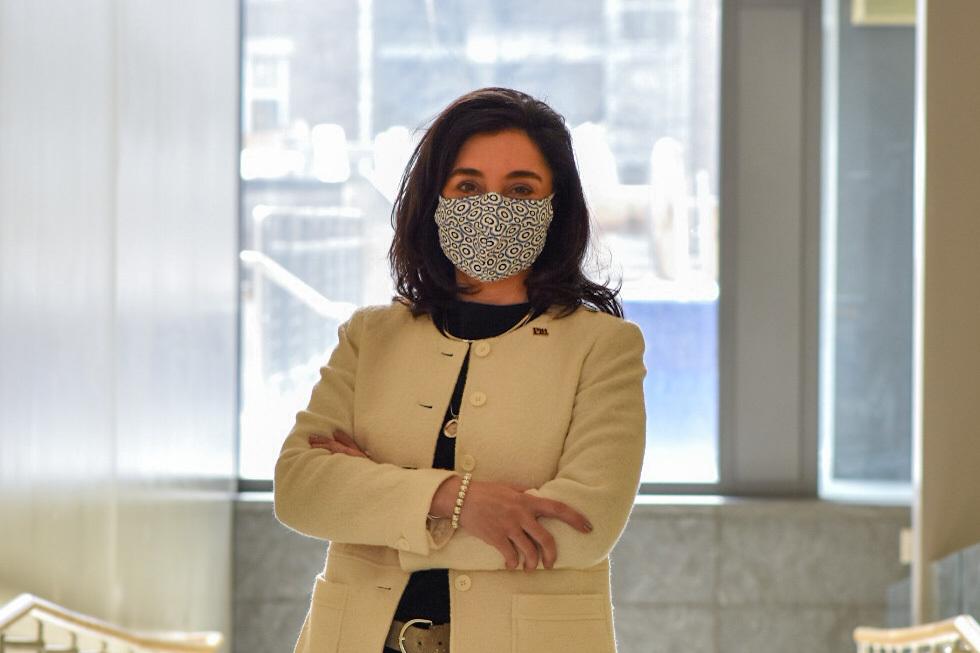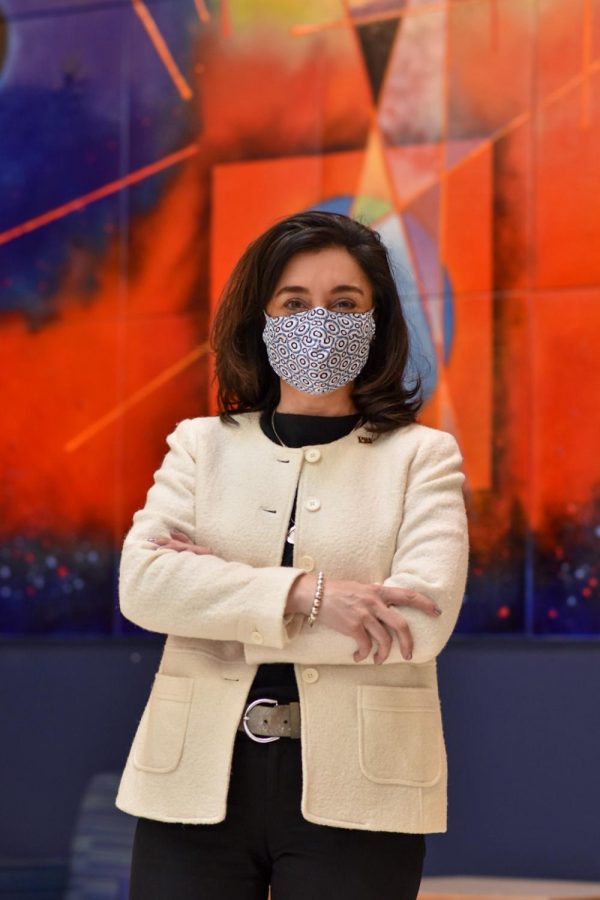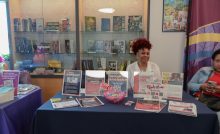Melissa McGivney: A shot of community


During her childhood, Melissa Somma McGivney often visited Bechtel’s Pharmacy in Slatington — a small town about an hour and a half north of Philadelphia.
While a routine visit for most, McGivney found herself in awe of the friendly neighborhood pharmacist, Joe Bechtel. He was well known in Slatington for helping neighbors pay their electric bills, contacting local hospitals when people had trouble and generally lending a hand without hesitation to a neighbor in need.
And at Pitt, McGivney — a professor and associate dean for community partnerships at the School of Pharmacy — is willing to do the same. Nearly 20 years later, McGivney credits Bechtel as one of her greatest inspirations for becoming a pharmacist.


McGivney began her journey in 1998 after completing her doctorate in pharmacy and residency at Pitt. She started her career in 1999 as a professor of pharmacy at Wilkes University in Wilkes-Barre. McGivney began working at UPMC in 2002 where she collaborated closely with physicians to provide medications to patients. Now, after almost 20 years working as a professor at the Pitt School of Pharmacy, McGivney helps coordinate COVID-19 vaccine distribution efforts on campus and throughout Pittsburgh.
While working as a practitioner and teacher, McGivney quickly noticed a disconnect between physicians, pharmacists and the communities they were serving. As she thought back to the role Bechtel played in her hometown, she realized what she needed to do.
“As I continued my training and started working alongside physicians, I wanted to figure out how every community could have a community pharmacy like the one in my hometown,” McGivney said. “So the work that I have done is really helping to unravel some of those barriers.”
As a leader in the School of Pharmacy, McGivney spends much of her time coordinating programs between the University, the greater Pittsburgh community and other pharmacy schools across the state. Due to the pandemic, much of McGivney’s time is spent working at home, and she jokes that her son thinks her job is just to be on the phone all day.
Since the COVID-19 vaccine first became available last December, McGivney has worked to mobilize vaccination efforts in Oakland and surrounding neighborhoods. Realizing that the vaccine would be in short supply for some time, McGivney wanted to ensure that the pharmacy school was prepared with the tools for distribution.
“We wanted to be in the position to have the infrastructure, including the space, the people, the personnel, the policies and procedures, ready to go in whichever way vaccine may become available,” McGivney said.
The University tasked her with setting up a clinic in January to vaccinate patient-facing students, which meant joining forces between students, faculty and the Allegheny County Health Department. Around eight hundred health care personnel from six Pittsburgh-area colleges and universities were vaccinated.
One of her first steps in this large undertaking was getting pharmacy students licensed to administer vaccines. Pitt faculty and students from the schools of Health and Rehabilitation Sciences, Pharmacy, Nursing and Medicine administered shots at the clinic. She then worked with other faculty members, as well as staff at the Petersen Events Center, to set up the main concourse social-distance-style with tables and chairs, and to stock up on the necessary supplies to distribute the vaccines.
Following the success of this clinic, county health officials contacted McGivney to take on a much bigger project — providing one thousand vaccines to senior citizens in Homewood and the Hill District. Pharmacy students again administered these vaccines, keeping in line with the School’s goal to help underserved neighborhoods and better exemplify to their students what equitable health care should be, as outlined by the new Pledge of Professionalism oath written this year.
“We had 72 hours to mobilize the entire operation, including working with our community organizations partners. The University’s Community Engagement Center leadership knew exactly who to call,” McGivney said.“That’s what’s really inspiring about both of these neighborhoods is they had already been organizing, being ready for the moment where the vaccine was going to become available.”
In true Bechtel fashion, McGivney decided to reach out to various community health care organizers to begin their efforts. Her primary role was to provide the clinical setting to distribute the vaccine.
Shannah Tharp-Gilliam — director of research and evaluation at the Homewood Children’s Village, an organization that is improving the lives of Homewood’s children and reweaving the fabric of the community in which they live — coordinated with McGivney and community members to roll out the vaccine clinics. Tharp-Gilliam recalls being blown away by the care that McGivney and her students provided.
“It’s fundamental to the mission of the School of Pharmacy to ensure that residents live with health and wellness,” Tharp-Gilliam said. “I saw that demonstrated in those students. Dr. McGivney has multiplied herself through the students she brought to the vaccination clinic.”
But unlike pharmacy students who study science all day long, many people within the Homewood and Hill District communities needed more information about the vaccine. According to Tharp-Gilliam, trusted members of the neighborhoods were able to contact qualifying neighbors to discuss any questions or concerns the patients had about the vaccine.
McGivney credits the success of these vaccine distribution efforts to trusted community officials who were able to do this work.
“We can teach, we can do presentations, we can market,” McGivney said. “At the end of the day we all trust the person that we know,” McGivney said. “[The community members] feel comfortable sharing with that friend, with that family member, with that individual that they know and care for to hopefully help advocate for that next person.”
Outside of organizing vaccine distributions, McGivney also teaches classes to first- and second-year pharmacy students about the importance of local health networks while also coordinating wellness efforts with the PA Pharmacists Care Network and the Community Pharmacy Enhanced Services Network.
Much of her work as an educator is dedicated to orienting students in their course Community Pharmacist Practice II, where student pharmacists work in community pharmacies and assist patients. Even though COVID-19 forced many of her students out of their programs, McGivney is still dedicated to getting her students back to working with patients.
“I wouldn’t say that it was a challenge. I look at everything as a new puzzle,” McGivney said. “So I’m always up for the next thing and that, recognizing that we are in a pandemic, we’re all in this thing together.”
McGivney said she’s impressed by her students’ dedication to providing COVID-19 tests and educating patients about their medications at local Giant Eagle and Rite Aid pharmacies.
McGivney added that watching her students adapt to working in a pandemic is something that inspires her, impressing her with their dedication to serve their communities.
“My students always inspire me,” McGivney said. “And I’ve been amazed over the years that when I get stuck, it just takes one, it just takes one student.”
Brooke Kulusich, a third-year student who has known McGivney since her first year of pharmacy school, sees her as an inspiration as well. Kulusich had an internship last summer that was cancelled due to COVID-19.
“When I learned that my summer internship had been cancelled due to the COVID-19 pandemic, Dr. McGivney was the first person I told,” Kulusich said. “While I was tempted to wallow in my disappointment, Dr. McGivney was already rattling off alternative plans to make the most of my summer and connect me with experiences that would align with my career goals. I know she would do this for any of her students.”
Throughout her time as a practitioner, McGivney has taught her students to take the time to really listen to their patients. She feels that being a primary contact for people is crucial to her role as a pharmacist.
“Pharmacists are in this really unique space where people can just walk in and talk to us,” McGivney said. “We’re the front door of health care. You can talk to pharmacists any time the door is open. And those doors stayed open, even during COVID.”
Tharp-Gilliam expressed in an email to McGivney after the Homewood and Hill District clinics how impressed she was with McGivney’s efforts to train her students to be attentive to the needs of others.
“Your students are a testament to the training they’re receiving. Your program is obviously doing an extraordinary job training the next generation of pharmacists,” Tharp-Gilliam said. “I say that because it’s not possible that every single person would have come into the program with the same high level of care and concern for a community outside their own.”
With a careful balance of hearing and teaching her patients, McGivney aims to meet the goals of both the health care system and the people that she serves. This balance is something she hopes to impart on her students as they continue to grow as pharmacists and community members.
“That’s why I teach,” McGivney said. “We’re teaching and supporting and, we hope, inspiring the students to care for the people in any community anywhere they are, to take care of their needs.”
Recent Posts
SGB addresses concerns about ICE presence on campus, hears SJP lawsuit against administration, approves governing code bill
At its weekly meeting on Tuesday at Nordy’s Place, Student Government Board heard concerns about…
ACLU of Pennsylvania sues Pitt over SJP suspension
The ACLU of Pennsylvania filed a federal civil lawsuit against the University of Pittsburgh and…
Marquan Pope: The ultimate shark
One of the most remarkable things about sharks is that an injury doesn’t deter them.…
Who Asked? // Do we really get a summer vacation?
This installment of Who Asked? by staff writer Brynn Murawski mourns the seemingly impossible perfect…
Notes From an Average Girl // Notes from my junior year
In this edition of Notes From an Average Girl, senior staff writer Madeline Milchman reflects…
Meaning at the Movies // The Power of the Movie Theater
In this edition of “Meaning at the Movies,” staff writer Lauren Deaton discusses her love…

